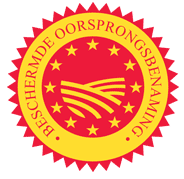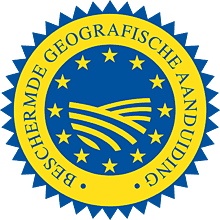3.5.1 - Agricultural products and foodstuffs
Print this pageProtected indications. Since 1992 geographical indications and designations or origin are the subject of a European protection regime. At present that protection is codified in EU Regulation (1151/2012) “on quality schemes for agricultural products and foodstuffs.” This regulation replaces earlier regulations of 2006 (510/2006) and 1992 (2081/92). The regulation makes it possible to protect certain indications via a registration system. At present, three kinds of indications can be protected under European Union law: (i) Protected Designations of Origin (“PDO”), Protected Geographical Indications (“PGI”) and (iii) Traditional Specialties Guaranteed (“TSG”).
 (a) Protected Designations of Origin (“PDO”)
(a) Protected Designations of Origin (“PDO”)
Designation of origin. Article 5(1) of Regulation 1151/2012 defines a “designation of origin” as “a name which identifies a product (a) originating in a specific place, region or, in exceptional cases, a country; (b) whose quality or characteristics are essentially or exclusively due to a particular geographical environment with its inherent natural and human factors; and (c) the production steps of which all take place in the defined geographical area.” The product must be produced in the geographical area concerned and that geographical origin must be relevant for the quality or characteristics of the product.
Feta, Gorgonzola and Parmesan cheese. Feta is eventually recognized as a protected designation of origin for a specific Greek cheese instead of a generic name for a particular kind of cheese, as the Court of Justice ruled in its Feta II-judgment of 25 October 2005 (IPPT20051025). Gorgonzola and Parmigiano Reggiano are examples of protected designations of origin. That follows from the judgements of the European Court of Justice of 3 April 1999 regarding Gorgonzola (IPPT19990403) and of 26 February 2008 regarding Parmesan (IPPT20080226). See also: CJEU, 2 May 2019, Queso Manchego, IPPT20190502; CJEU, 19 December 2018, Schwartzwalder Schinken. IPPT20181219; CJEU, 7 June 2018, Scotch Whisky, IPPT20180607.
Use as ingredient. In its Champagner Sorbet-judgement of 20 December 2017 (IPPT20171220) the Court of Justice learns that the use of a protected designation of origin (PDO) as part of a food product that does not correspond to the product specifications for that PDO, but contains an ingredient that does – like “Champagner Sorbet” containing 12% champagne – cannot, in itself, be regarded as unfair use against which PDOs are in all circumstances protected. However, if that foodstuff does not have, as one of its essential characteristics, a taste which is primarily attributable to the presence of that ingredient, such use should be regarded as “intended to take unfair advantage of the reputation of a PDO.”
Use in signs. A designation of origin consists of words, such as “queso manchego” for a Spanish sheep's milk cheese made from manchego sheep from the La Mancha region. This region is also known for the novel hero Don Quixote, created by the writer Cervantes. In principle, the unlawful use of this designation of origin can also be relevant when one does not use that designation trough words, but through the use of images - such as of a knight on horse with a shield with, for example, windmills in the background. Combined with the use of indications such as “adarga” or “Rocinante”, this can call to mind the protected designation of origin, according to the Court of Justice in its judgment of 2 May 2019 (Fundación Queso Manchego v IQC, IPPT20190502).
(b) Protected Geographical Indications (“PGI”)
 Geographical indications. Article 5(2) of EU Regulation 1151/2012 defines a “geographical indication” as “a name which identifies a product (a) originating in a specific place, region or country; (b) whose given quality, reputation or other characteristic is essentially attributable to its geographical origin; and (c) at least one of the production steps of which take place in the defined geographical area.” The difference with a protected designation of origin is therefore (i) that not all, but only one of the production steps needs to take place in the geographical area concerned, and (ii) that it can be sufficient that not the quality or characteristics of the product but only its reputation is attributable to its geographical origin.
Geographical indications. Article 5(2) of EU Regulation 1151/2012 defines a “geographical indication” as “a name which identifies a product (a) originating in a specific place, region or country; (b) whose given quality, reputation or other characteristic is essentially attributable to its geographical origin; and (c) at least one of the production steps of which take place in the defined geographical area.” The difference with a protected designation of origin is therefore (i) that not all, but only one of the production steps needs to take place in the geographical area concerned, and (ii) that it can be sufficient that not the quality or characteristics of the product but only its reputation is attributable to its geographical origin.
Bayerisches Bier. Bayerisches bier is a registered PGI for beer. That led to a conflict with the older registration of Bavaria as a trade mark for beer by a Dutch brewing company. It follows from the decision by the Court of Justice of 20 December 2010 in Bayerische Brauerbund v Bavaria (IPPT20101220) that the older Bavaria trade mark can exist next to the PGI “Bayerisches bier”.
Aceto Balsamico di Modena. In its judgment of 4 December 2019 The Court of Justice held that when a Protected Geographical Indication consists of a combination of words, the protection awarded covers (a) that combination as such and (b) its components, with exception of non-geographical components that are generic or common names. The terms “aceto” and “balsamico” are common names for “vinegar” and “vinegar with a characteristic sweet and sour taste”, respectively.
(c) Traditional speciality guaranteed (“TSG”)
 Traditional speciality. The Regulation of 2012 also introduced the possibility to protect the indication for a guaranteed traditional speciality. Article 18 learns that a name is eligible for registration as a traditional speciality guaranteed “where it describes a specific product or foodstuff that (a) results from a mode of production, processing or composition corresponding to traditional practice for that product or foodstuff; or (b) is produced from raw materials or ingredients that are those traditionally used.” The name thus does not indicate a geographical original but the use of a traditional mode of production or the use of certain traditional ingredients. In this context ‘traditional’ means proven usage on the domestic market for a period that allows transmission between generations, which period is to be at least 30 years (article 3(3)).
Traditional speciality. The Regulation of 2012 also introduced the possibility to protect the indication for a guaranteed traditional speciality. Article 18 learns that a name is eligible for registration as a traditional speciality guaranteed “where it describes a specific product or foodstuff that (a) results from a mode of production, processing or composition corresponding to traditional practice for that product or foodstuff; or (b) is produced from raw materials or ingredients that are those traditionally used.” The name thus does not indicate a geographical original but the use of a traditional mode of production or the use of certain traditional ingredients. In this context ‘traditional’ means proven usage on the domestic market for a period that allows transmission between generations, which period is to be at least 30 years (article 3(3)).
Mozzarella and Serrano ham. Mozzarella and Serrano ham are examples of a registered TSG.

















